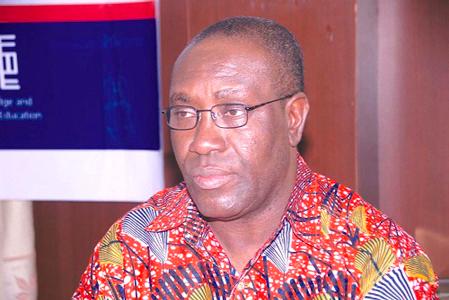The first two cases of Coronavirus infection were detected in Ghana about three months ago.
In this short period, the impact of the pandemic on our health and well-being has been overwhelming, as evidenced by the number of cases of infection and deaths reported by the health authorities.
The destructive effects of the pandemic on our health and the economy do not even tell the whole story.
Experts in various disciplines have identified equally damaging psychological, political, sociological and cultural effects of Covid-19 with dire consequences for human rights, workers’ rights, women’s rights, children’s rights, and for human development, generally.
These are important dimensions of the coronavirus pandemic that deserve the attention of experts in these fields.
This article briefly discusses: the impact of the pandemic on the economy, employment and livelihoods; the measures government is taking to mitigate the effects of the pandemic; and TUC’s recommendations on how to protect businesses, jobs and livelihoods.
Impact on economic and fiscal performance
Ghana’s economy has been growing at a rate of about seven per cent per annum in the last three years. GDP was projected to grow at 6.8 per cent in 2020.
Due to the pandemic, GDP is now expected to grow at about 1.5 per cent this year.
This represents a projected loss in output growth of more than five percentage points (about GH¢18 billion).
Government revenue is projected to fall by nearly GH¢8.0 billion.
At the same time, government expenditure is projected to increase tremendously to fund Covid-19-related programmes, to protect businesses, jobs and livelihoods, and to revitalise the economy.
The rising government expenditure and declining revenue are expected to create a budget deficit of over six per cent of GDP. Public debt is expected to increase beyond 60 per cent of GDP.
As rightly observed by the TUC in a recent submission to government “how this huge deficit is financed will determine not only how quickly Ghana can recover from the effects of the pandemic but also how Ghana can restore the pre-COVID-19 growth and sustain it in the medium to long term in such a way that the Ghana Beyond Aid agenda is not jettisoned in the COVID-19 storm”.
Impact on enterprises, employment and livelihoods
The pandemic has impacted various sectors differently. The hotels and restaurants sector and the air transport sector are among the sectors that have been severely affected.
Currently, almost all the big hotels and restaurants have either closed down completely or they are operating at their minimum capacities.
All international airlines and companies providing aviation and handling services have ceased operation. Some manufacturing companies have closed down. Exports and imports have slowed down drastically.
Consequently, a number of businesses have laid off their employees.
Trade unions operating in the private formal sector have reported lay-offs affecting thousands of workers across all the major sectors of the economy including agriculture, tourism and hotels, manufacturing, construction, trade, finance, real estate, transport, private health and education sectors, utilities and entertainment.
Part-time employees and casual workers are particularly vulnerable. Many more workers are likely to lose their jobs if the pandemic persists.
Informal economy workers have not been spared. Farmers in rural areas have lost their livelihoods.
In the urban areas, the livelihoods of owners and drivers of taxis and trotro, spare parts merchants, mechanics, barbers, hairdressers, market women, domestic workers, caterers food vendors (chop bar owners), small-scale entrepreneurs engaged in arranging weddings and funerals, musicians, actors, masons, carpenters, electricians, steel benders, tailors, seamstresses, fashion designers, shop owners and tour guides have been severely impacted by the pandemic.
This is not the first time Ghana is experiencing economic downturn. In the 1970s and 80s, Ghana experienced recessions.
The severest recession occurred in 1975 when Ghana recorded a real GDP growth rate of -12.87 per cent. Less severe recessions occurred in 1972 with growth rate of -2.5 per cent, 1976 (-3.52%), 1979 (-7.82%), 1981 (-3.5%),1982 (-6.92%), and 1983 (-4.56%).
In all those years, employment and livelihoods were adversely affected. But the impact of this pandemic on employment, jobs and incomes may be unprecedented if the pandemic persists.
Mitigating Social and Economic Effects of the Pandemic
Government has taken some measures to mitigate the effects of the pandemic on households, businesses and on the economy as a whole.
The measures include distribution of food to vulnerable households in Accra and Kumasi during the three-week partial lockdown, provision of free water for households and businesses nationwide for three months, free electricity for lifeline consumers nationwide for three months, 50 per cent subsidy on electricity for all businesses and non-lifeline households nationwide for three months.
Others included incentive package for frontline health workers (tax relief and allowance equal to 50 percent of basic pay for frontline health workers for three months – April, May, and June, 2020).
In addition, the following measures have been taken towards stabilisation and revitalisation of the economy.
Measures Recommended by TUC
In the submission mentioned above, TUC recommended further measures and urged government to continue to pursue the President’s vision of Ghana Beyond Aid towards self-reliance, economic transformation, attitudinal change, and commitment to values such as patriotism, honesty, compassion, hard work, discipline, transparency and accountability which are critical for national development.
The following are the key recommendations: Stimulus package
• A stimulus package of at least GH¢18 billion (about 5.2% of GDP). The primary objective of the stimulus package is to enable businesses to keep all their employees in this difficult period. A stimulus package of this magnitude will provide a big boost to consumption, investment and export and restore growth to pre-Covid-19 levels in the next two or three years.
Work – sharing system
• A work-sharing system similar to the German Kurzarbeit system. Under the work-sharing scheme, workers are required to voluntarily reduce the number of hours they work per week to allow other workers, who otherwise would have been laid off, to share the reduced volume of work available.
The role of government is to provide payroll support to enterprises to keep all their employees. The work-sharing system does not only mitigate the employment impact of the economic crisis, but it also helps to maintain employment relationship between enterprises and workers.
This is particularly important for enterprises that need skills and competences that require long periods of training.
Keeping workers in employment reduces the post-crisis cost to employers who otherwise would have to invest time and money to hire and train new workers to acquire desired skills.
• Establishment of Workers Compensation Insurance Scheme (WCIS) in preparation for future economic crisis. Employers and their employees can contribute to the scheme which will make funds available to pay workers part of their basic salaries in times of crisis.
Social grant
• Social Grant of GH¢140 per month to vulnerable households.
A social grant of GH¢140 per month (i.e., the current National Poverty Line) for the very vulnerable households targeting households with members aged 70 years or above without pension, households with members with disability, and households headed by women with children under five years of age. A social grant will mitigate the social and economic effects on such vulnerable households.
Use of Heritage fund
• Given the severity of the current crisis, government should not hesitate to “borrow” funds from the Heritage Fund. What ought to be done is for government to treat any amount it withdraws from the Heritage Fund as a loan to be repaid with the appropriate interest when the COVID-19 storm has passed.
Borrowing from the Heritage Fund is better for us now and in the future than borrowing from other sources.
But we should replenish the fund in preparation for future crisis if government finds it necessary to “borrow” from it.
Conclusion
The Coronavirus pandemic is likely to be with us for a long time. Efforts are being made around the world to develop a vaccine as soon as possible to prevent further spread.
But it may take at least a year to get a vaccine. Until a vaccine is found the effects of the pandemic on social and economic lives are likely to deepen.
More businesses are likely to close down and more workers are likely to lose their jobs and livelihoods.
The measures government is taking to deal with the crisis may help to mitigate its harsh effects on the economy. But a lot more may be needed.
This is the time all social partners and stakeholders should work with government to protect jobs and livelihoods and revitalise the economy so that we can continue to pursue the objectives of Ghana Beyond Aid.






